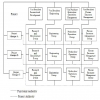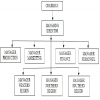Home | ARTS | Management Concepts & Organisational Behaviour
|
Overcoming the Barriers - Delegation Of Authority And Decentralization
Management Concepts & Organisational Behaviour - Delegation Of Authority And Decentralization
Overcoming the Barriers - Delegation Of Authority And Decentralization
Posted On :
Several of the barriers to delegation discussed above mostly relate to the behavioral aspects of individuals.
Overcoming
the Barriers
Several of the barriers to delegation discussed above mostly relate to the behavioral aspects of individuals. Insecurity, aversion to risk, lack of self confidence, inability to trust another to perform a task are all different types of manifestations of human behavior. Among the various barriers, psychological barriers are the most difficult ones to overcome. In order to overcome many of these barriers, both superiors and subordinates must take a hard look at themselves, recognize their own fears and try to come out of the inhibitions. The following measures may help delegation to be effective:
Several of the barriers to delegation discussed above mostly relate to the behavioral aspects of individuals. Insecurity, aversion to risk, lack of self confidence, inability to trust another to perform a task are all different types of manifestations of human behavior. Among the various barriers, psychological barriers are the most difficult ones to overcome. In order to overcome many of these barriers, both superiors and subordinates must take a hard look at themselves, recognize their own fears and try to come out of the inhibitions. The following measures may help delegation to be effective:
Effective Communication: When a
subordinate does not perform the
tasks as expected by management, the problem can be faulty communication. In
the hurry to get the things done, managers may skip through what they exactly
expect from the subordinate. The subordinate may also hesitate to ask questions
for looking stupid. At times, subordinate too, may be in a hurry to get on with
the job. Consequently, both the parties may think they
understand what was assigned and expected. Later, often too late, the work is
not done right and both are disappointed. Thus, effective communication to
subordinates of their responsibilities, tasks, and authority reduces the
chances of misunderstandings between the two and thus paves the way for
fruitful accomplishment of the tasks.
Parity of Authority and Responsibility: For delegation to be effective, it is necessary for authority and responsibility to be commensurating, that is, superior must delegate sufficient authority for the subordinate in order to enable him to accomplish the task for which he has assumed responsibility. For example, a marketing manager who got the task of increasing sales can accomplish the task, only when he is given authority to conduct an advertising campaign and provide motivational incentives to sales people. Absence of such an authority to use the organizational resources lands him in frustration. Imagine yourself for a while in the situation of having responsibility for the tasks without sufficient authority. In such a case you would let the superior know as soon as possible the actual situation and get the situation corrected.
Incentives for additional responsibility: Additional responsibility usually means additional work. An individual in any system expects to be rewarded for the additional responsibilities. But unfortunately, many organizations fail to offer positive rewards. Current research strongly indicates that employees will not be fully motivated if they feel they are giving the organization more than what they are getting. The rewards may be in many forms. Additional pay, promotional opportunity, a better job title, praise, added status, more pleasant working conditions, etc.
Though delegation broadly involves assignment of duties and granting of necessary authority to subordinates the actual practices vary. Having understood the concept of delegation of authority, the Dos and Don’ts, it is appropriate to take a look at the different degrees of delegation. Harvey Sherman categorized the following six degrees of delegation:
1. Take action – no further contact with me is needed.
2. Take action – let me know that you did
3. Look into this problem – Let me know what you intend to do; do it unless tell you not to.
4. Look into this problem – Let me know what you intend to do; delay action until I give approval.
5. Look into this problem – Let me know alternative actions available with pros and cons and recommend one for my approval
6. Look into this problem – give me all facts; I will decide what to do.
Parity of Authority and Responsibility: For delegation to be effective, it is necessary for authority and responsibility to be commensurating, that is, superior must delegate sufficient authority for the subordinate in order to enable him to accomplish the task for which he has assumed responsibility. For example, a marketing manager who got the task of increasing sales can accomplish the task, only when he is given authority to conduct an advertising campaign and provide motivational incentives to sales people. Absence of such an authority to use the organizational resources lands him in frustration. Imagine yourself for a while in the situation of having responsibility for the tasks without sufficient authority. In such a case you would let the superior know as soon as possible the actual situation and get the situation corrected.
Incentives for additional responsibility: Additional responsibility usually means additional work. An individual in any system expects to be rewarded for the additional responsibilities. But unfortunately, many organizations fail to offer positive rewards. Current research strongly indicates that employees will not be fully motivated if they feel they are giving the organization more than what they are getting. The rewards may be in many forms. Additional pay, promotional opportunity, a better job title, praise, added status, more pleasant working conditions, etc.
Though delegation broadly involves assignment of duties and granting of necessary authority to subordinates the actual practices vary. Having understood the concept of delegation of authority, the Dos and Don’ts, it is appropriate to take a look at the different degrees of delegation. Harvey Sherman categorized the following six degrees of delegation:
1. Take action – no further contact with me is needed.
2. Take action – let me know that you did
3. Look into this problem – Let me know what you intend to do; do it unless tell you not to.
4. Look into this problem – Let me know what you intend to do; delay action until I give approval.
5. Look into this problem – Let me know alternative actions available with pros and cons and recommend one for my approval
6. Look into this problem – give me all facts; I will decide what to do.
Tags : Management Concepts & Organisational Behaviour - Delegation Of Authority And Decentralization
Last 30 days 1155 views














